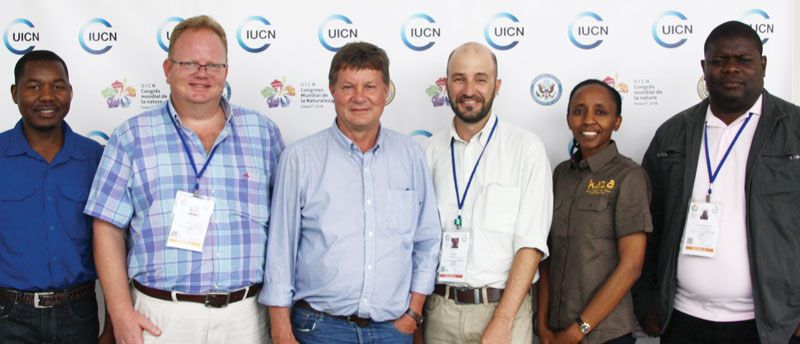
Planet at the Crossroads – IUCN congress in Hawaii

“Hunting is important not only in contributing to our common conservation objectives but in helping to drive rural development and improve livelihoods. But hunting is under threat often from well meaning protectionist who do not fully appreciate the complexities of nature” according to the delegation who attended the World Conservation Congress of the International Union for Conservation of Nature (IUCN) in Hawaii.
To address common misconceptions around hunting, the members of the Namibian delegation worked hard to ensure that the Namibian voice was heard. The Permanent Secretary in the Ministry of Environment and Tourism, Dr Lindeque outlined Namibia’s model of conservation and sustainable development in a number of workshops and events including a workshop on Africa at the Cross Roads. Mr Uatirohange Tjiuoro from the ministry did a presentation on Sustainable Use in conservancies,Mr Angus Middleton of the Namibia Nature Foundation addressed a packed workshop on the future of hunting and Mr Johnson Ndokosho, also from the ministry, participated in various workshops and sessions. In all the presentations the point was made that the sustainable use of wildlife is not only good for conservation but good for rural development.
Returning to Namibia, the delegation said in a statement “most welcome was the motion on the management and regulation of selective intensive breeding of large wild mammals for commercial purposes, which explicitly calls for the governments to adopt a risk adverse strategy.” “Hunting is regarded as a premium product because of its natural setting, wild animals and most Namibian hunters’ adherence to the principles of Fair Chase, something that should be maintained at all costs. At the same time there was a motion recognising that the often-quoted panacea to livelihood and environmental issues, “Tourism”, comes with its own impacts which will further guide the work of the domestic standard EcoAwards, hosted by the Namibia Nature Foundation. “Namibia provides a good example to the international community, almost 45% of the country is protected, [it] has the only viable free-range black rhino population, the only expanding wild lion population and an increase in elephants from 7000 in the 1990’s to over 20,000 today. But this does not come without challenges, poaching pressure is on the rise, human wildlife conflict increasing and much more must be done to use our conservation successes to drive rural development and fulfil our common purpose of Harambee” stated the delegation.
Namibia’s conservation success is not only a national success but is also a global gain and the Namibian delegation worked hard to enable sustained investment in conservation programmes.











































